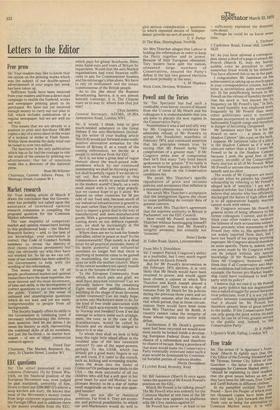Powell and the Tories
Sir: The Spectator has had such a creditable, even heroic, record of dissent from the U-turns of Mr Heath and his colleagues it is understandable that you are keen to placate the new regime in the Conservative Party, Nonetheless it was a sad and silly way for Mr Cosgrave to celebrate the admirable refusal of Mr Powell's to accept the fraudulent manifesto of February 1974, and continued assertion that his principles remain true, by saying that Mr Powell lacks "the compromises of a greater man." If Mr Cosgrave seeks men of compromise then he'll find many Tory front bench spokesmen to be 'greater.' If he really is keen on fostering this quality he'll find job lots of them on the Conservative candidates list.
We await Mrs Thatcher's specific repudiation of price and incomes policies, and acceptance that inflation is a monetary phenomenon.
We await Mrs Thatcher's acceptance that the immigration figures she chose to cease publishing do contain data of general concern.
We await Mrs Thatcher's agreement that the supreme authority in Britain is Parliament: not the EEC Council.
How could Mr Powell acclaim Mrs Thatcher without humbugging himself? Mr Cosgrave may find Mr Powell's integrity awesome, but certainly not `tiresome.'
Peter Clarke 21 Toiler Road, Quorn, Leicestershire From Mrs S. Donaldson Sir: I respect Patrick Cosgrave's ability as a journalist, but I very much regret his attack on Enoch Powell.
But for Mr Powell's intervention in the February 1974 election, it is very likely that Mr Heath would have been returned to power, and would again have chosen a cabinet in which Mrs Thatcher and Keith Joseph played a prominent part. There was no sign of remorse from Mr Heath for his policies during the previous three years and we may safely assume, after the silence of that whole period, that in those circumstances there would have been none from Mrs Thatcher and Sir Keith. A country cannot value the integrity of those whose regrets only arrive with defeat.
Furthermore if Mr Heath's government had been returned we would now most surely be locked inside a developing European Federal State, with no chance of a referendum and therefore no chance of escape. Being a province of that state would make the Conservative Party eventually irrelevant since such a state would be dominated by Continental Socialist parties of various shades.
Sheila Donaldson 2 Lytchet Road, Bromley, Kent Sir: Bill Jamieson (March 8) once again raises the question of Mr Enoch Powell's position on the EEC.
Which Mr Powell is he talking about? The Mr Powell who was ardently for the Common Market at one time or the Mr Powell who now appears on platforms with Mr Clive Jenkins against it?
Mr Powell has never — at least to me
Spectator The
March 22, 1975 — sufficiently explained the dramatic turn-about. Perhaps he could let us know some time. L. Titchner 1 Carholme Road, Forest Hill, London SE23
Sir: As you have allowed a correspondent about a third of a page to attack Mr Powell (March 8), may my barely audible voice be permitted to utter somewhat fewer words in his defence? You have allowed this to me in the past. I congratulate Mr Jamieson on his achievement in taking up so much space in your correspondence column, but his letter is nevertheless quite extraordinary. In his pontificating lecture to Mr Powell on the virtues of humility he says that the word is "not known for its frequency on Mr Powell's lips." In fact, the word humility was employed more frequently by Mr Powell than most other politicians until it recently became incorporated in the politicians fashionable English usage and therefore in danger of becoming cheapened.
Mr Jamieson says that "it is for Mr Powell to earn . . . a place in the Shadow Cabinet" like a pat on the back, I suppose. Mr Jamieson talks of a place in the Shadow Cabinet as if it was a sinecure rather than a duty. I want Mr Powell to be in the Shadow Cabinet because I seek the good first of the country, secondly, of the Conservative Party and not at all of Mr Powell. What Mr Powell or anyone else earns is for his benefit and no other. The words of Mr Cosgrave are more relevant when he parades his classical scholarship by referring to Mr Powell's alleged lack of 'amicitia.' I am not a, classical scholar, but I find it difficult to believe that anyone who has efficiently discharged the duties of high office and is to all appearances happily married cannot work with others.
Mr Cosgrave accuses Mr Powell in general terms of being offensive to his former colleagues. I cannot, and do not think your other readers can, estimate the fairness of such accusations unless I know precisely what statements of Mr Powell they refer to. His speeches are not widely reported these days, but 1 have not heard of his saying anything improper. Mr Cosgrave should therefore be more specific. There is, indeed, only one point made by Mr Cosgrave which can be judged without any special knowledge of Mr Powell's speeches. Does Mr Cosgrave, however, really think that if all Conservative anti-Market candidates had followed Mr Powell's example, the former pro-Market leadership could have continued to lead the party with its policy?
I believe that we owe it to Mr Powell that party politics has not degenerated into a naked struggle for power between rival politicians, even if it is not yet the conflict between contending principles that it should be. Mr Powell has 'therefore already been of great service to the Public. If the Conservative Party can only grasp the prize within its easY reach, he can be of even greater service to the public and, indeed, to the Conservative Party.
D 5 Queen's Walk, Ealing, London E. d n\F vo5lkes


































 Previous page
Previous page